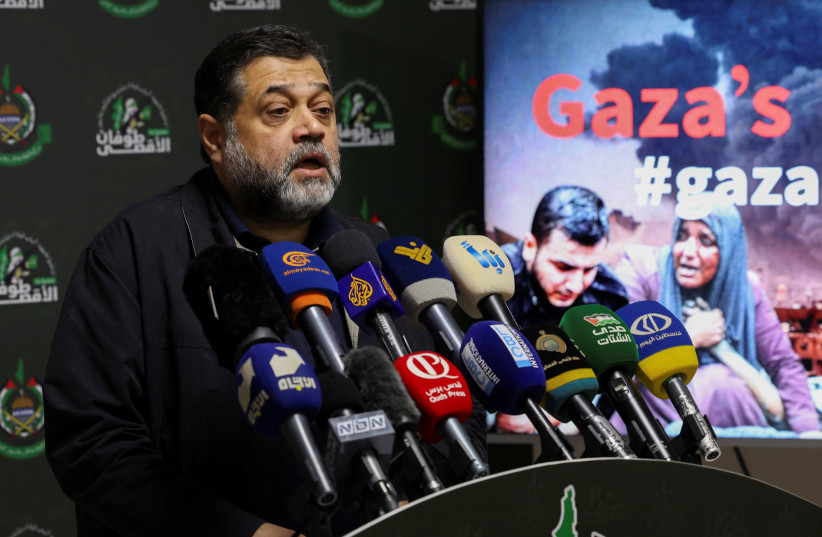Hamas publicly insisted Tuesday that a permanent ceasefire must be in place before any deal is implemented for the release of the remaining 134 hostages held in Gaza, in a statement that seemed to run counter to optimism from Washington that an agreement was possible before the start of the holy month of Ramadan.
“In the past two days, the movement presented its position on the proposal put forward by the brotherly Qatari and Egyptian mediators,” senior Hamas official Osama Hamdan said in Beirut.
He spoke as ceasefire talks mediated by both Egypt and Qatar continued in Cairo with no sign of a breakthrough.
“We reaffirmed our conditions for a ceasefire: a full pullout from the Strip and the return of the displaced [Palestinians] from areas they left, in particular in the north,” he said.
Hamdan repeated his group’s conditions for a deal: An end to the Gaza war, a withdrawal of Israeli troops, and the return of displaced Palestinians to homes they have fled in other parts of the enclave.

Israel has insisted that it must be allowed to complete its military campaign in Gaza to destroy Hamas. The current proposal on the table attempts to bypass the gap between the two sides by putting in place a six-week pause in exchange for the release of 40 hostages. Israel would, in exchange, free from its jails some 400 security prisoners and terrorists.
US officials continued to push from Washington for a deal, with US Secretary of State Antony Blinken holding back-to-back meetings with Qatari Prime Minister Mohammed Al-Thani and Minister Benny Gantz.
Israel cooperating, deal 'in the hands of Hamas' Biden says
US President Joe Biden, National Security Communications Adviser John Kirby, and State Department spokesperson Matthew Miller clarified in their public comments that the onus remained on Hamas.
Before boarding Air Force One on Tuesday, Biden said that a deal “was in the hands of Hamas right now. Israelis have been cooperating. There’s been a rational offer. We will know in a couple of days what’s going to happen. We need a ceasefire.”
It was particularly important to secure a six-week pause to the war before the start of Ramadan.
If the war continues into Ramadan, Biden said, “it’s going to be very dangerous. So, we are trying very hard to get a ceasefire.”
Blinken, before his meeting with Thani, said, “We have an opportunity for an immediate ceasefire that can bring hostages home, that can dramatically increase the amount of humanitarian assistance getting to Palestinians who so desperately need it, and can also set the conditions for an enduring resolution.
“It is on Hamas to make decisions about whether it is prepared to engage in that ceasefire,” he said.
A senior Hamas official told NBC that it was the US that must pressure Israel to reach a deal. “It is now in the hands of the Americans if they are serious about achieving a ceasefire before Ramadan,” NBC quoted the official as saying.
Three security sources from host and mediator Egypt told Reuters the warring sides still wanted a deal but were sticking to demands that had held up an agreement so far. The Egyptians have remained in contact with the Israelis despite the absence of an Israeli delegation in Cairo.
Naim told Reuters the group had presented its proposal for a ceasefire agreement to the mediators and was now waiting for a response from the Israelis, who have stayed away from this round.
“(Prime Minister Benjamin) Netanyahu doesn’t want to reach an agreement, and the ball is now in the Americans’ court” to press him for a deal, Naim said.
Israel has declined to comment publicly on the talks in Cairo, but a senior Israeli official denied Israel was holding up a deal: “Israel is making every effort to reach an agreement. We are awaiting a response from Hamas.”
A source told Reuters earlier that Israel was staying away because Hamas had rejected its demand to furnish a list of all hostages who are still alive. Naim said this was impossible without a ceasefire first, as hostages were scattered across the war zone and held by separate groups.
The Egyptian security sources said US, Egyptian, and Qatari mediators were seeking to overcome this difference by offering separate guarantees to Hamas of peace talks to end the war.
